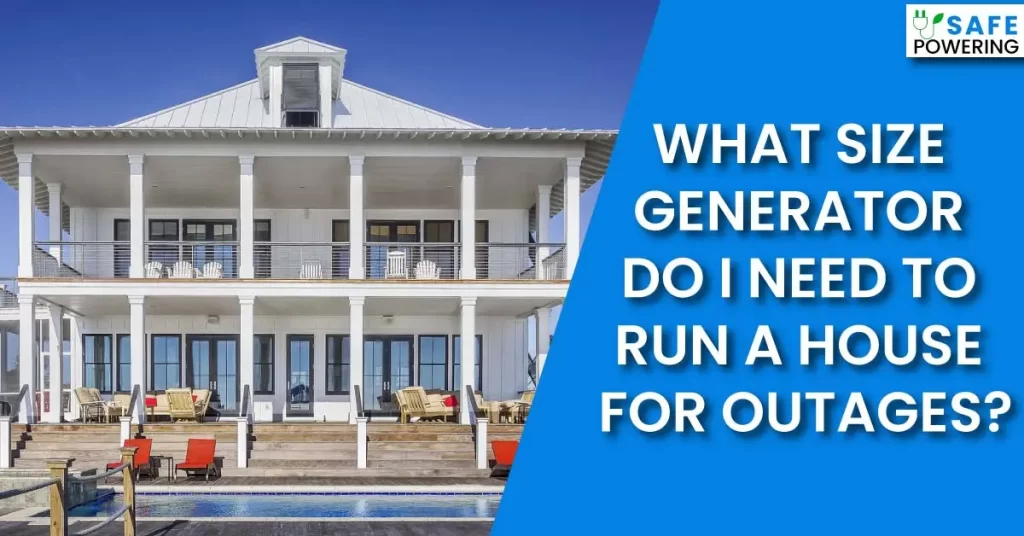What Size Generator Do I Need To Run A House for Outages?
The fact you are reading this article means you’ve made up your mind to invest in a backup generator for your house. However, you might also be asking yourself like me when I first purchased mine, “What size generator do I need to run a house”?
Due to frequent floods, hurricanes, wild storms, extreme colds, and other environmental disasters, power outages are becoming common and frequent.
Due to such reasons, the sale of backup generators has increased by more than 50% since 2020.
This surge in demand highlights the importance of having a reliable backup power source for your home. When considering purchasing a generator, it’s important to know what size generator you need to run your house.

How Big of a Generator Do I Need to Run a House?
The size of the generator you need to run your house will depend on your power requirements.
As a rule of thumb, a generator with a wattage output between 5,000 and 7,500 watts can power most essential appliances and electronics in an average-sized home during an outage. However, larger homes with higher power requirements may require a generator with a higher wattage output.
It’s important to calculate your power needs before choosing a generator to ensure that you have enough power to keep your essential appliances and electronics running during an outage.
Before taking a guess, you need to calculate the wattage of your home to find the accurate generator that can run whatever appliances you want it to run.
How to Calculate Watts for The Generator?
It is really simple to do that. The watt is ampere times voltage. It means you need to multiply the amperes of any appliance, by its voltage. You will get watts.
WATT = AMP x VOLT
Suppose your refrigerator is rated at 112 volts and 7 amps, then the total watts it is going consume is:
Watts = 7 x 112
Watts = 784
This is a rough estimation of course because we take starting watts into account as well. All motor-driven appliances have different starting watts and starting watts. Let’s discuss what they are.
Starting Watts and Running Watts
Starting Watts:
Starting, surge or peak watts is the sudden jump of power for a short moment for a motor-driven appliance consumes to overcome inertia to start.
The initial torque of motor-driven appliances takes a lot of power to start.
This is usually a temporary spike in power demand that lasts for a few seconds. For example, when you start a refrigerator or an air conditioner, it requires a higher amount of power to get the motor running.
Therefore, generators are typically rated in terms of their starting watts, as this is the maximum amount of power they can provide for a short period of time.
If you own a fridge, check our article about the generator size required to run a fridge as well.
Running Watts:
Running, rated, or continuous refers to the power an appliance needs to operate continuously.
Recommended Read: What Size Generator to Run a 2000 Sq Ft House?
A Simple Wattage Calculator To Calculate Your Powering Needs
Total Starting Watts: 0
Total Running Watts: 0
HOME & KITCHEN APPLAINCES:

Electric Grill 1.6 kW

Curling Iron

Central AC 40.000 BTU

Central AC 10.000 BTU

Ceiling Fan

Dishwasher

Iron (Clothes)

Window AC 15.000 BTU

Window AC 12.000 BTU

Window AC 5.000 BTU

Clothes Dryer

Light LED Bulb

Toaster

RV AC 13.500 BTU

RV AC 10.000 BTU

RV AC 7.000 BTU

Furnace Fan 1/2 HP

Furnace Fan 1/3 HP

Washing Machine

Coffee Maker

Deep Freezer

Light Bulb 60 W

Security System

Electric Water Heater

Microwave Oven

Well Pump 1/2 HP

Vacuum Cleaner 12AMPS

Sump Pump (1 HP / 115 V)

Garage Door Opener 1/2 HP

Sump Pump 1/3 HP

Sump Pump 1/2 HP

Food Processor

Jumbo Sized Refrigerator/Freezer
GARDENING & JOB SITE TOOLS:

Air Compressor (0.25 HP)

Air Compressor (0.50 HP)

Air Compressor (1.00 HP)

Air Compressor (1.50 HP)

Air Compressor (2.00 HP)

Electric Strimmer

Electric Leaf Blower

Cultivator (1/3 HP)

Belt Sander

Bench Grinder

Chain Saw 12” (1.5 HP)

Circular Saw (7.25")

Concrete Vibrator (0.75 HP)

Concrete Vibrator (1.00 HP)

Concrete Vibrator (2.00 HP)

Electric Drill

Hammer Drill

High-Pressure Washer (1.00 HP)

Jointer/Planer

Miter Saw (10")

Reciprocating Saw

Table Saw (10")

Welder (Electric)
Factors to Consider When Choosing a Generator for a Home?
1. Power Requirements of your Home:
To determine how much power you need, make a list of the essential appliances and electronics that you want to power during an outage.
Add up their wattage requirements to get an estimate of the total wattage you need. I have already explained how can you calculate the total wattage of your home.
This will help you determine the size and wattage of the generator you need.
2. Type of Generator:
Portable generators are smaller and can be moved around as needed. They typically have a lower wattage output and are suitable for powering essential appliances and electronics during an outage.
Standby generators are larger and are installed outside your home, connected directly to your home’s electrical system.
They can provide power to your entire home and automatically switch on when the power goes out.
Standby generators are more expensive than portable generators but offer more convenience and higher power output.
3. Fuel Type:
Generators can run on different fuel types, including gasoline, propane, diesel, or natural gas.
The fuel type you choose will depend on the availability, cost, and storage requirements in your area.
Gasoline is the most common fuel for portable generators, but it has a short shelf life and can be difficult to find during emergencies.
Propane and diesel generators are more efficient and have a longer shelf life but may be more expensive.
Natural gas generators are convenient if you have a natural gas line in your home, but they may require a larger upfront investment for installation.
Apart from that, you don’t need to worry about fuel storage because gas will be available 24/7 and it burns the cleanest, and it is not that expensive compared to other fuel types based on per watt generated.
Spare a few minutes of your time and read this research about generator safety for homes.
4. Noise level:
Generators can be loud and disruptive, especially if you live in a densely populated area.
Look for generators with low decibel ratings if you want to minimize noise pollution.
In general, larger generators produce more noise than smaller generators, so consider the size of the generator when choosing a model with low noise levels.
Anything below or close to 65dB is fine. Standby generators in general are less loud.
Conventional gasoline generators make a lot of sounds, but the latest inverter generators are somewhat less noisy.
5. Maintenance Requirements:
Consider the ongoing costs associated with maintaining and servicing your generator.
Standby generators require more maintenance than portable generators, and you may need to hire a professional for installation and maintenance.
Portable generators require less maintenance but may require more frequent refueling and oil changes.
We have also got an article on the generator size required to run a furnace, and the generator size needed to run a sump pump. Both items are commonly used in medium-sized homes so you might want to check them as well.
What Size Generator Do I Need to Run a House During Blackouts?
The following is a rough estimation of the total watts consumed in a medium-sized home. You may not use all the appliances at the same time but the following table will help you to understand the load distribution.
Common Home Appliances in a Medium-Sized Home
| Electronics/Devices | Starting Watts | Running Watts |
| Refrigerator | 1200 Watts | 200 Watts |
| Freezer | 800 Watts | 250 Watts |
| Electric Water Heater | 4500 Watts | 4500 Watts |
| Sump Pump | 1200 Watts | 800 Watts |
| Air Conditioner (2.5 ton) | 3800 Watts | 1500 Watts |
| Furnace Fan (1/2 HP) | 1800 Watts | 900 Watts |
| Electric Oven | 3000 Watts | 3000 Watts |
| Electric Range | 3000 Watts | 3000 Watts |
| Dishwasher | 1500 Watts | 1500 Watts |
| Washing Machine | 1200 Watts | 1200 Watts |
| Electric Dryer | 5400 Watts | 5400 Watts |
| Microwave | 1000 Watts | 1000 Watts |
| Television | 120 Watts | 80 Watts |
| Lights (20x 100W bulbs) | 2000 Watts | 2000 Watts |
| Computer and Monitor | 400 Watts | 200 Watts |
Recommended Read: What Size Generator to Run 5 Ton AC Unit?
12000 Watts Generator for Home
| Electronics/Devices | Starting Watts | Running Watts |
| Air Conditioner | 3500 Watts | 1500 Watts |
| Desktop Computer | 800 Watts | 200 Watts |
| Laptop Computer | 0 Watts | 60 Watts |
| Television | 120 Watts | 80 Watts |
| Gaming Console | 200 Watts | 150 Watts |
| Electric Heater | 1500 Watts | 1500 Watts |
| Hair Dryer | 1800 Watts | 1200 Watts |
| Iron | 1200 Watts | 1200 Watts |
| Electric Oven | 3000 Watts | 3000 Watts |
| TOTAL | 11,250 Watts | 9,550 Watts |
- Recommended Read: What can a 12kw generator run?
8000-Watt Generator for Home
| Electronics/Devices | Starting Watts | Running Watts |
| Refrigerator | 1200 Watts | 200 Watts |
| Deep Freezer | 1300 Watts | 700 Watts |
| Electric Water Heater | 4500 Watts | 4500 Watts |
| Sump Pump | 1200 Watts | 800 Watts |
| Air Conditioner (2.5 ton) | 3800 Watts | 1500 Watts |
| TOTAL | 12,200 Watts | 7,900 Watts |
This estimation is only for running heavy-duty appliances at the same time. You aren’t going to do that of course.
- Recommended Read: What appliances can an 8000 generator run?
Frequently Asked Questions (FAQs)
How Do I Choose the Right Size Generator for My Home?
The size of the generator you need depends on the total power requirements of your home, which can vary based on the appliances and devices you have. You can calculate your power requirements by adding up the wattage of each appliance or device you plan to power with the generator.
Can I Run All My Home Appliances on a Generator at Once?
It depends on the size of your generator and the total power requirements of your home. A typical home generator can power several appliances at once, but it may not be able to handle the total power requirements of all appliances at the same time. Make sure to consult the user manuals or labels on your appliances to determine their exact power requirements, and never overload your generator beyond its rated capacity.
What Are Some Common Appliances People Run on Generators?
Common appliances and devices that people use generators to power include refrigerators, freezers, electric water heaters, sump pumps, air conditioners, furnaces, ovens, ranges, dishwashers, washing machines, dryers, microwaves, televisions, computers, and lights.
What Are Some Safety Considerations When Using a Generator at Home?
When using a generator at home, it’s important to follow all safety guidelines provided by the manufacturer. This may include ensuring that the generator is properly grounded, keeping it at least 10 feet away from the home, and never operating it indoors or in enclosed spaces.

Fareed, the highly skilled electrical expert, boasts 5 years of extensive experience in proficiently maintaining, repairing, diagnosing, and installing a diverse range of electrical systems.
